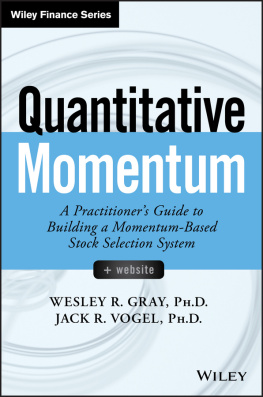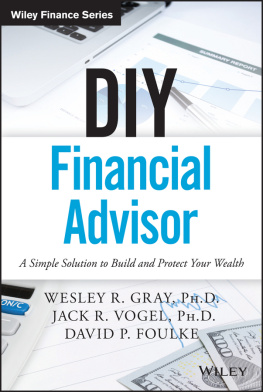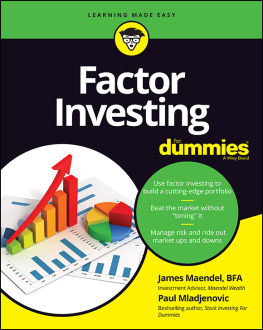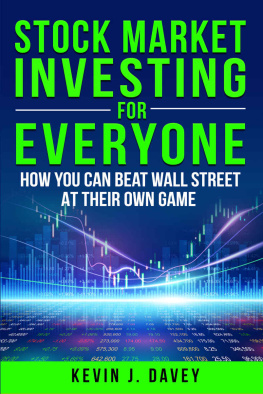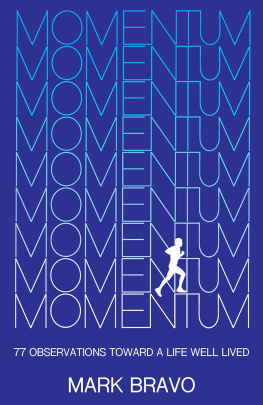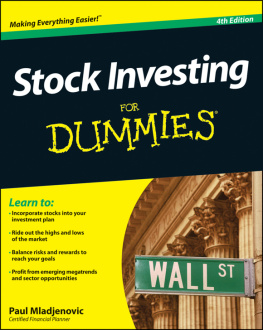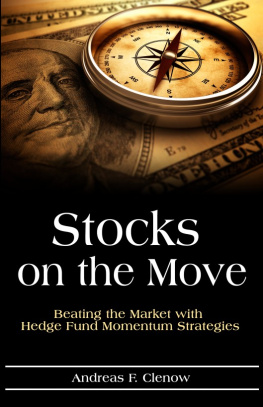
Founded in 1807, John Wiley & Sons is the oldest independent publishing company in the United States. With offices in North America, Europe, Australia and Asia, Wiley is globally committed to developing and marketing print and electronic products and services for our customers' professional and personal knowledge and understanding.
The Wiley Finance series contains books written specifically for finance and investment professionals, as well as sophisticated individual investors and their financial advisers. Book topics range from portfolio management to e-commerce, risk management, financial engineering, valuation and financial instrument analysis, as well as much more.
For a list of available titles, visit our website at www.WileyFinance.com.
Copyright 2016 by Wesley R. Gray and Jack R. Vogel. All rights reserved.
Published by John Wiley & Sons, Inc., Hoboken, New Jersey.
Published simultaneously in Canada.
No part of this publication may be reproduced, stored in a retrieval system, or transmitted in any form or by any means, electronic, mechanical, photocopying, recording, scanning, or otherwise, except as permitted under Section 107 or 108 of the 1976 United States Copyright Act, without either the prior written permission of the Publisher, or authorization through payment of the appropriate per-copy fee to the Copyright Clearance Center, Inc., 222 Rosewood Drive, Danvers, MA 01923, (978) 750-8400, fax (978) 646-8600, or on the Web at www.copyright.com. Requests to the Publisher for permission should be addressed to the Permissions Department, John Wiley & Sons, Inc., 111 River Street, Hoboken, NJ 07030, (201) 748-6011, fax (201) 748-6008, or online at http://www.wiley.com/go/permissions.
Limit of Liability/Disclaimer of Warranty: While the publisher and author have used their best efforts in preparing this book, they make no representations or warranties with respect to the accuracy or completeness of the contents of this book and specifically disclaim any implied warranties of merchantability or fitness for a particular purpose. No warranty may be created or extended by sales representatives or written sales materials. The advice and strategies contained herein may not be suitable for your situation. You should consult with a professional where appropriate. Neither the publisher nor author shall be liable for any loss of profit or any other commercial damages, including but not limited to special, incidental, consequential, or other damages.
For general information on our other products and services or for technical support, please contact our Customer Care Department within the United States at (800) 762-2974, outside the United States at (317) 572-3993 or fax (317) 572-4002.
Wiley publishes in a variety of print and electronic formats and by print-on-demand. Some material included with standard print versions of this book may not be included in e-books or in print-on-demand. If this book refers to media such as a CD or DVD that is not included in the version you purchased, you may download this material at http://booksupport.wiley.com. For more information about Wiley products, visit www.wiley.com.
Library of Congress Cataloging-in-Publication Data:
Names: Gray, Wesley R., author. | Vogel, Jack R., 1983- author.
Title: Quantitative momentum : a practitioners guide to building a momentum-based stock selection system / Wesley R. Gray, Jack R. Vogel.
Description: Hoboken, New Jersey : John Wiley & Sons, Inc., [2016] | Series: Wiley finance series | Includes index.
Identifiers: LCCN 2016023789 (print) | LCCN 2016035370 (ebook) | ISBN 9781119237198 (cloth) | ISBN 9781119237266 (pdf) | ISBN 9781119237259 (epub)
Subjects: LCSH: Stocks. | Investments. | Technical analysis (Investment analysis)
Classification: LCC HG4661 .G676 2016 (print) | LCC HG4661 (ebook) | DDC 332.63/2042dc23
LC record available at https://lccn.loc.gov/2016023789
Cover image: Wiley
Cover design: Frank Rohde/Shutterstock
Buy cheap; buy strong; hold 'em long.
Wes and Jack
Preface
The efficient market hypothesis suggests that past prices cannot predict future success. But there is a problem: past prices do predict future expected performance and this problem is generically labeled momentum. Momentum is the epitome of a simple strategy even your grandmother would understandbuy winners. And momentum is an open secret. The track record associated with buying past winners now extends over 200 years and has become the ultimate black eye for the efficient market hypothesis (EMH). So why isn't everyone a momentum investor? We believe there are two reasons: hard-wired behavioral biases cause many investors to be anti-momentum traders, and for the professional, who wants to exploit momentum, marketplace constraints make this a challenging enterprise.
As long as human beings suffer from systematic expectation errors, prices have the potential to deviate from fundamentals. In the context of value investing, this expectation error seems to be an overreaction to negative news, on average; for momentum, the expectation error is surprisingly tied to an underreaction to positive news (some argue it is an overreaction, which cannot be ruled out, but the collective evidence is more supportive of the undereaction hypothesis). So investors that believe that behavioral bias drives the long-term excess returns associated with value investing already believe in the key mechanism that drives the long-term sustainability of momentum. In short, value and momentum represent the two sides of the same behavioral bias coin.
But why aren't momentum strategies exploited by more investors and arbitraged away? As we will discuss, the speed at which mispricing opportunities are eliminated depends on the cost of exploitation. Putting aside an array of transaction and information acquisition costs, which are nonzero, the biggest cost to exploiting long-lasting mispricing opportunities are career risk concerns on behalf of delegated asset managers. The career risk aspect develops because investors often delegate to a professional to manage their capital on their behalf. Unfortunately, the investors that delegate their capital to the professional fund managers often assess the performance of their hired manager based on their short-term relative performance to a benchmark. But this creates a warped incentive for the professional fund manager. On the one hand, fund managers want to exploit mispricing opportunities because of the high expected long-term performance, but on the other hand, they can do so only to the extent to which exploiting the mispricing opportunities doesn't cause their expected performance to deviate too farand/or for too longfrom a standard benchmark. In summary, strategies like momentum presumably work because they sometimes fail spectacularly relative to passive benchmarks, creating a career risk premium. And if we follow this line of reasoning, we only need to assume the following to believe that a momentum strategy, or really any anomaly strategy, can be sustainable in the future:
- Investors will continue to suffer behavioral bias.
- Investors who delegate will be short-sighted performance chasers.
We think we can rely on these two assumptions for the foreseeable future. And because of our faith in these assumptions, we believe there will always be opportunities for process-driven, long-term focused, disciplined investors.
Assuming we are prepared to be a momentum investor and we've internalized the reality that the journey has to be painful in order to be sustainable, we need to address a simple question:
Next page
